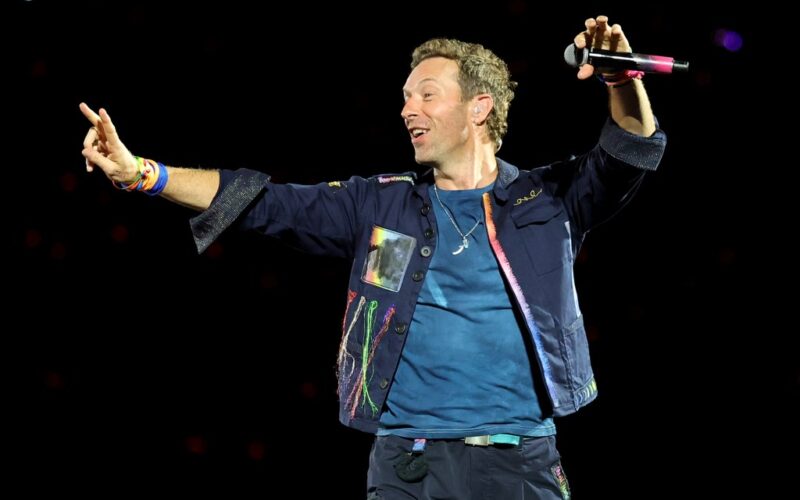By now, you’ve definitely seen it — the viral video of Andy Byron and Kristin Cabot in the canoodle heard ‘round the world.
The two were at a Coldplay concert outside Boston, and they were caught on the jumbotron kiss cam at the exact worst moment, with their arms wrapped around each other looking very much in love.
But they’re married to other people. When the camera found them snogging and they saw themselves on the big screen in front of 66,000 people in Gillette Stadium, they instinctively ducked.
Coldplay frontman Chris Martin joked, “Either they’re having an affair or they’re very shy.”
And this being 2025, it was caught on fans’ phones and swiftly uploaded to social media, where Byron and Cabot’s lives were changed forever.
Byron was quickly identified as the CEO of tech startup Astronomer, and he has since been forced to resign. His wife Megan Byron has retreated to their Maine mansion and has gone back to her maiden name, Kerrigan, on social media.
Byron’s paramour, Kristin Cabot, who was the company’s chief people officer, has been placed on leave. Her husband is Privateer Rum CEO Andrew Cabot, who hails from one of Boston’s oldest and most prominent families.
Needless to say, this hasn’t been a fun chapter for any of them. But the rest of us seemingly can’t get enough of the saga.
The story’s made international headlines, spawned endless memes online, and has even become a gag at other sporting events, where team mascots and fans have been recreating the viral embrace.
But what is it that has us so obsessed with this mini soap opera? Is it just a good distraction from an otherwise heavy and chaotic news cycle? Is it schadenfreude? Pathos? Are we terrible people?
Joseph Reagle, associate professor of communication studies at Northeastern University tells Northeastern Global News that there are a few reasons.
“The clip itself was no more than five seconds,” he says. “It was perfectly sized to go viral.”
Also, “It’s having a mystery that affords additional investigating and sleuthing.”
And, “[T]he substance of what is happening obviously contains some kind of morality tale — it has moral implications.”
I think this is all true and part of it. But it’s bigger. It’s about the justice of it all.
In that moment, we witnessed the direct and significant consequences of Byron and Cabot’s bad choices. They weren’t only caught, but they were caught on camera in the biggest and worst way imaginable. And they were swiftly punished — in the social media comments, by their company, and presumably by their families.
That kind of immediate justice feels elusive today.
In our political system, for example, the president of the United States is a convicted criminal, an adjudicated sexual abuser, a jerk and an ignoramus. He paid no meaningful price for his crimes, his personal failings, or his incompetence. In fact, he was unduly rewarded for all of those things.
In corporate America, high-profile CEOs are making ungodly salaries and bonuses while laying off scores of employees in a punishing economy and job market. Last year, Microsoft CEO Satya Nadella got a $30 million pay raise after laying off 2,500 workers. Disney CEO Bob Iger got a 30% pay increase in 2024, despite painful layoffs, giving him a $41.1 million salary.
Criminal justice also feels like anything but. ICE agents held a six-year-old boy with cancer and his family for a month in a Texas detention center. Meanwhile, Sean “Diddy” Combs was acquitted on sex trafficking charges and may only see a few years of jail time, despite horrific videos of him abusing his ex-girlfriend.
From out-of-control healthcare costs to endless flight delays, we constantly feel taken advantage of and robbed of accountability in so many areas of our lives.
The need for justice is psychological and, according to some studies, innate. Dr. Nigel Barber Ph.D. says, “A sense of fairness may be ingrained in all primates. It is an essential ingredient in functional societies because it makes social relationships predictable. Predictability matters because animals must decide whether other individuals are reliable allies or treacherous foes.”
This need for justice can reveal an ugly side of human nature. Many cheered the assassination of a pharmaceutical company CEO. Millions tuned in to watch the sentencing of Idaho murderer Bryan Kohberger on Wednesday. Police bodycam videos are among the most popular to watch on YouTube.
Though it feels trivial — and maybe even a little gross of us — the kiss cam couple gave us the momentary glimpse of justice that we all may have needed: people making bad decisions and suffering the consequences. Finally.








